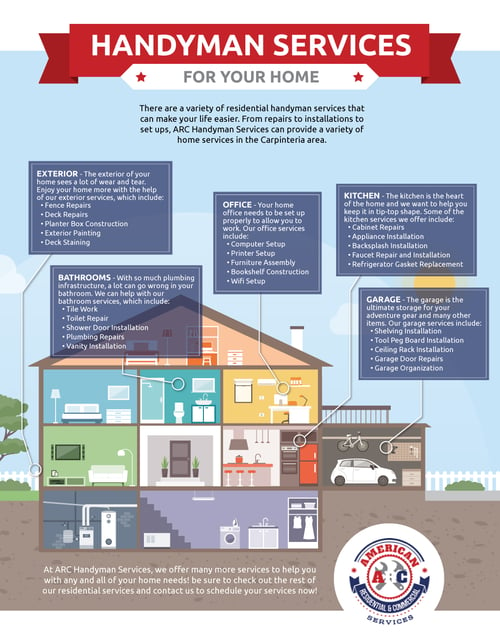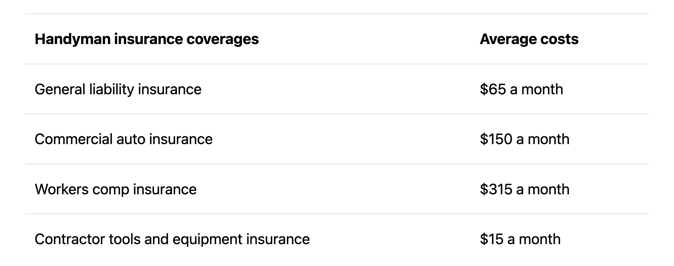How To Start a Handyman or Handywoman Business
If you're wanting to learn how to start a handyman business, this article is for you. It covers all of the steps involved and what to consider before starting.

If you're good with your hands, comfortable with tools, and have always wanted to be your own boss, starting a handyman or handywoman business might be just the ticket. This article will provide the tips and tricks you need to get your new business up and running in no time.
From writing your business plan to learning how to get the word out about your new company to legal requirements, let’s walk through how to start a handyman or handywoman business.
According to Future Market Insights, the United States has the highest demand for handyman services. North America accounts for more than 35% of the global handyman market.

Jump to:
-
Handymen and Handywomen: How Women are Growing the Industry
-
What are Services Typically Offered by a Handyman Business?
-
The Path To Starting Your Own Handyman Business
-
What To Consider When Starting a Handyman Business
-
Don't Wait, Start Today
Handymen and Handywomen: How Women are Growing the Industry
Historically, it has been rare to see women working in trade industries. But in recent years, things have taken a turn – more women are learning the tools of the trade at all levels, from working as contractors for larger companies to owning and running their own businesses outright.
Women bring unique qualities to the table when it comes to being a successful handyperson. They often have a strong eye for detail and can be more creative with problem-solving than their male counterparts. And they’re usually able to build long-term relationships with customers that result in repeat business down the road.
With home services and trade jobs expected to explode to nearly 8.4 million in 2029, the sky's the limit for women wanting to start their handywoman businesses.
What are Services Typically Offered by a Handyman Business?
Handyman services include a wide variety of jobs you can perform for your customers, including the following:
- Repairing furniture, fixtures, and appliances
- Installing new doors and windows
- Fixing broken plumbing or electrical systems (if you have the proper license)
- Drywall installation and repair
- Painting walls and ceilings
- Landscaping work such as mowing lawns, trimming hedges, planting trees and shrubs
- Gutter cleaning and repair
- Minor carpentry jobs like building shelves or fences

Source: ARC
As you can see above, there is virtually no limit to the jobs you can perform for customers as a handyman or handywoman. All you need to do is decide what services to offer based on your comfort level and skill set.
The Path To Starting Your Own Handyman Business
With a bit of preparation and careful planning, you’ll guarantee yourself smooth sailing when you start going out on house calls.
1. Brainstorm the Handyman Services You Want To Provide
The key to success with your new handyman and handywoman business is knowing what services you want to offer. To get started, brainstorm the types of home repairs and maintenance you can provide.
Do you have experience in plumbing, electrical work, carpentry, or painting? Are there other jobs you know how to do, such as lawn care or snow removal? Once you have a list of all your business's services, you’ll be ready for the next step.
`2. Start Writing a Handyman Business Plan
It’s not always necessary to build a business plan. But a good plan on paper (or hard drive) allows you to make better decisions, save on costs, and even seek funding. A solid business plan should include these documents:
- Executive summary. This is a brief overview of what the entire business plan will cover.
- Business description. A section providing an in-depth description of your business and its operations.
- Market analysis. Research the market and analyze potential customers who might need your services.
- Competitive analysis. Analyze other businesses in your field, including their strengths and weaknesses.
- Operations plan. A plan that describes the day-to-day operations of your business, including management and staffing.
- Pro forma statement. A statement that shows your expected income and expenses for the upcoming year.
- Break-even analysis. Analyzing your financials helps you figure out how much money you need to make sure your business pays for itself and starts to earn a profit.
- Three-year cash flow statements. These statements show your business's projected cash flow over three years, which is essential when applying for loans or investors.
- Marketing plan. This plan outlines your strategies for finding and keeping customers.
- Management team. Who will be managing the business? Include information about each team member, such as experience and qualifications.
- Business Structure. What type of structure is best for your business (sole proprietorship, LLC, etc.)?
Entrepreneurs who build and update their business plans are far more likely to succeed. Keep in mind that you may need to make educated guesses and consult professionals (such as small business attorneys and accounts) to complete all the sections above.
`3. Complete the Business Registration Process
After you've crafted your business plan and chosen what type of business you'll be (LLC, sole proprietorship, etc.,) the next step is registering for a business license. This might vary from state to state, but in general, you will need to:
1. Get a federal tax ID number (EIN). The IRS will use this nine-digit number when filing taxes, which is required for most business entities. You can apply online or by mail with the IRS.
2. Apply for a state tax ID number. Depending on your business location, you may need to get a state tax ID number from the Department of Revenue in your state. This number will be used when filing taxes and paying specific fees.
3. Register your business name. If you plan to use a name other than your own for the handyman business, make sure it isn't already taken by searching the USPTO database and then registering it with the Secretary of State in your state. If a name you want is taken, you may be able to register your name federally and then file a DBA (doing business as) at your local county clerk’s office.
These steps will help ensure your handyman or handywoman business is running legally.`4. Obtain Business Liability Insurance and Other Required Documentation
Business liability insurance helps protect your company if someone makes a claim against it due to injury or damage that occurs as part of your services. This coverage also protects any property that may be damaged during the course of providing services for customers.
Without this protection, you could face financial hardship if a claim is made against your business. In addition to business liability insurance, you may also need to obtain specific licenses or paperwork depending on the type of services you provide and the laws in your area.

Source: BravoPolicy.com
For example, if you plan to do any electrical work, you will likely need an electrician's license to operate legally. You must research all necessary requirements before starting your handyman or handywoman business so that your new venture can get off on the right foot.
`5. Choose a Pricing Model
Choosing a pricing model that makes sense for you and your customers is essential. Here are some tips on how to decide what to charge:
Consider the type of work you’ll be doing
If you plan to do primarily small jobs like fixing a leaky faucet or hanging a door, then charging by the job may be more beneficial for your business. This way, you can quote customers a flat rate and know exactly how much money you'll make from each job.
However, if the majority of your work is bigger projects, such as remodeling kitchens or bathrooms, then it might be better to charge by the hour. That way, if any issues arise during the project that requires additional time or resources, they will only eat into your profits a little.
Research your local market
Knowing what other handymen in your area charge for similar services will help you set competitive rates. Consider offering discounts for larger projects, loyalty incentives, or promotions for new customers.
Think about the value of your service
You'll need to balance providing a fair price with the value you offer. Remember that customers are willing to pay more when they feel like they're getting an excellent product or service.
`6. Calculate Your Business Expenses and Get Funding
It’s important that you accurately calculate all the expenses that come with running a business. Here are some of the costs you may need to consider:
- Equipment such as ladders and tools
- Insurance
- Office supplies
- Marketing materials like flyers
- Website creation or maintenance fees
- Professional services (e.g., bookkeeping)
Getting Funding
Once you have an accurate estimate of your start-up costs, it’s time to look for ways to get the money you need. Here are some of the methods available to you:
- Small business loans from banks, credit unions
- Grants from government agencies and private organizations
- Business credit cards
Getting Loans Through the US Small Business Administration
The SBA is an excellent option for getting a loan for your handyman or handywoman business. The process involves submitting an online application and providing information about yourself, your business plan, and your financial information. Once approved, the SBA will provide funds that can be used to cover start-up costs.
Getting a Business Credit Card
Many business owners choose to use a business credit card for their expenses. This helps them keep track of their spending and makes it easier to separate personal and business expenses. Paying off your balance each month is essential, or you may be charged high-interest rates on outstanding balances.
`7. Create a Website and Social Media Accounts
Creating a website and social media accounts is an important part of starting your handyman or handywoman business. You have two options: you can use a website builder and DIY, or choose an all-in-one website solution to create everything (including your social media pages) for you.
If you choose to build your own web presence, that’s great! Many people do. But keep in mind that it takes time and a fair amount of technology know-how to create something eye-catching and engaging.
Popular platforms for DIY websites include WordPress, SquareSpace, or Weebly. Additionally, it’s a good idea to teach yourself the basics of search engine optimization (SEO) before you get started, since this will make or break your website’s visibility online (and greatly impact how likely you are to show up on Google).
On the other hand, all-in-one website solutions like GoSite create the website for you, including social media presence, widgets, and tools to help you convert web visitors. Solutions like these are purpose-built to save handyman or handywoman businesses both time and money, and they help make sure you don’t miss anything while doing so.
8. Set Up Your Online Presence
A well-rounded online presence helps potential customers find your services, learn more about what you offer, and contact you when they're ready to hire. Ensure your business information is up-to-date in online directories like Google My Business, Bing, and other local SEO directories. 
Source: GoSite Placement & Google Business Management
You should also optimize each listing by filling out as much information as possible about your business, so it stands out from the competition. Include your contact information, services offered, business hours, and other relevant details that people should know about you.
8. Reel in Customers With Your Marketing Strategies
When you’re first starting out, you may not have much budget for marketing or advertising, but there are many ways to generate “buzz” creatively and cost-effectively.
Get creative with word-of-mouth. Use flyers or business cards to spread the word about your handyman services in the community.
Join local networking groups. Get involved in local events related to home improvement and join interest groups on social media platforms.
Offer discounts and specials. Offer promotions like referral programs or discounts for repeat customers to attract more people.
Sponsor a charity event. Sponsor a charity event related to home maintenance work or renovations so you can reach a wider audience.
Partner with local businesses. Partner with other home-service companies in your area to expand your reach.
What To Consider When Starting a Handyman Business
The Skills You Possess
Starting a handyman business requires you to have specific skills. As the owner, you’ll be responsible for doing all of the tasks that need to be done. That means being able to do things like carpentry, plumbing, painting, and more. It also means knowing safety protocols and tools.
Think about what skills you already possess from previous experience or training. These can include hard technical skills, such as understanding how to use power tools safely and correctly, or soft interpersonal skills, such as communicating with clients effectively. A good mix of both will make it easier for your business operations to run smoothly.
The Type of Clients You Want To Attract
Do you want to work with residential or commercial clients? Do you have a specialty in a particular type of repair, such as plumbing, carpentry, appliances, etc.? Knowing the answers to these questions can help you decide what kind of handyman or handywoman business is right for you.
You should also consider who your potential customers are and where they live. Are your services going to be needed by local residents or businesses nearby? Or do you want to provide services for people further away?
Taking into account the location of your target market is essential when deciding how far away from your home base you’re willing to travel.
If You're Required To Hold a Contractor License
Depending on where you live, there may be specific regulations that require you to hold a contractor's license. If this is the case for your area, then it’s crucial that you obtain one before beginning your business.
To do this, you must complete all necessary paperwork and pass any applicable tests required by your state or local government to receive a valid license. It’s also important to note that these licenses typically have expiration dates, so keep track of when yours needs to be renewed.
If You'll Work Alone or Hire Employees With Specialized Skills
Hiring employees can take time and money, so it’s important to think about how much help you need. If you decide to work alone, all the jobs will rely on your skillset and availability. This is great if certain tasks require specific knowledge or expertise that no one else has.
On the downside, if something unexpected or an emergency job pops up, it might be hard for just one person to handle it. However, hiring employees will cost money and could be expensive depending on the size of your business and the number of people you need to employ. Consider all options carefully before deciding what's best for your business.
Don't Wait, Start Today
Starting a handyman or handywoman business can be daunting, but with the right preparation and research, it can be a great way to make money. It takes hard work and dedication, but you will be satisfied knowing that your time and effort have paid off.
By completing all of the necessary steps, such as registering your business, getting the proper licenses, understanding local laws, and setting up a website or social media page for marketing purposes, you are well on your way to success!
%20(1)%20(1).png?width=340&name=Group%2012%20(2)%20(1)%20(1).png)



